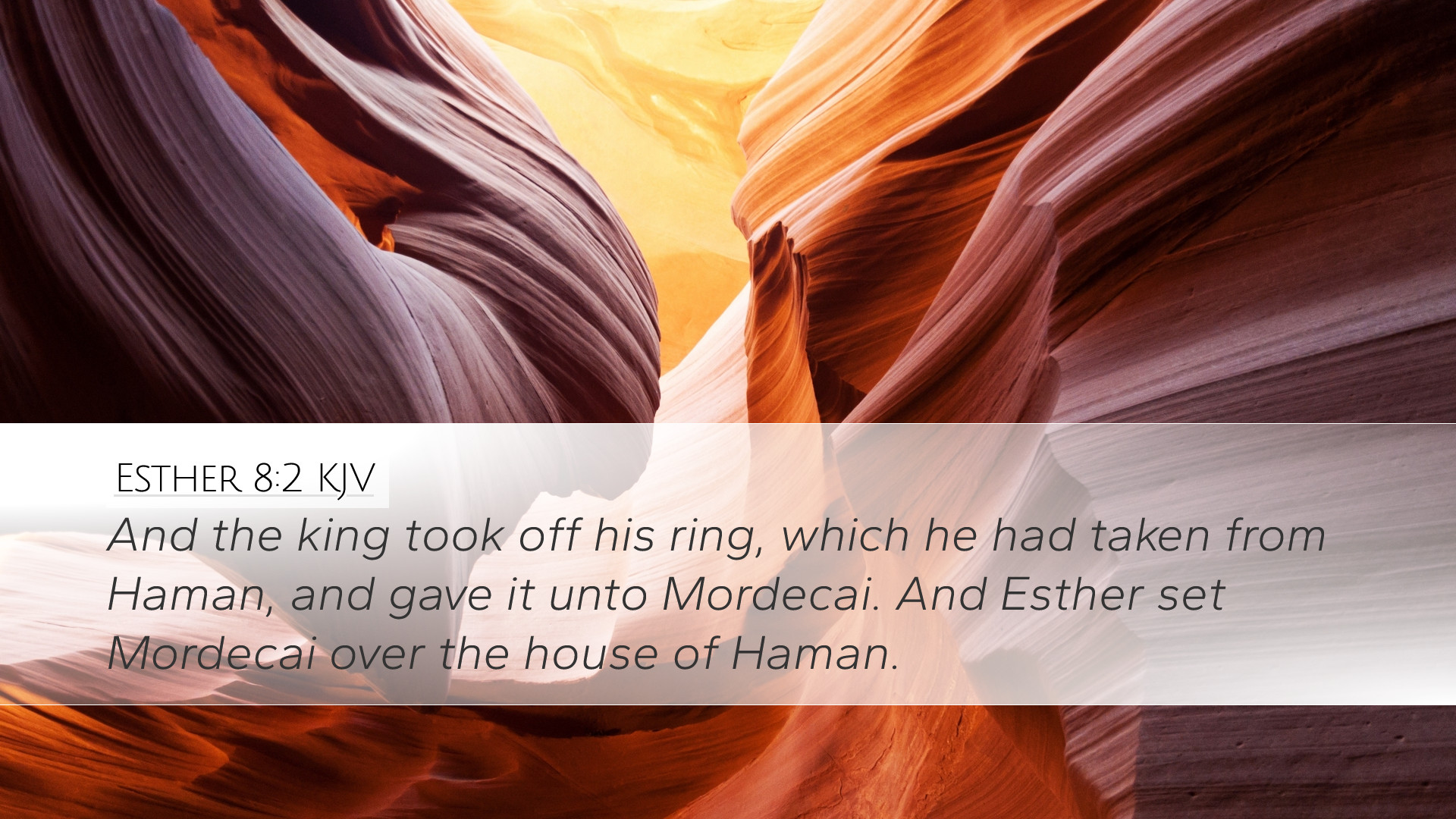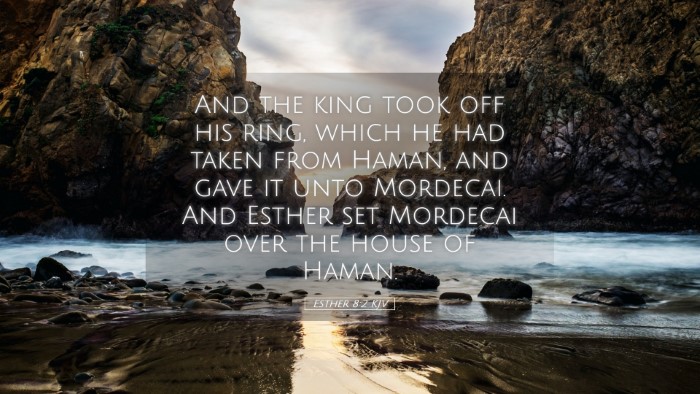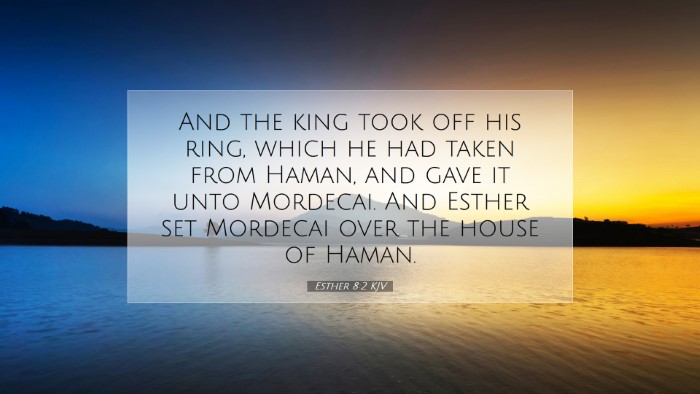Old Testament
Genesis Exodus Leviticus Numbers Deuteronomy Joshua Judges Ruth 1 Samuel 2 Samuel 1 Kings 2 Kings 1 Chronicles 2 Chronicles Ezra Nehemiah Esther Job Psalms Proverbs Ecclesiastes Song of Solomon Isaiah Jeremiah Lamentations Ezekiel Daniel Hosea Joel Amos Obadiah Jonah Micah Nahum Habakkuk Zephaniah Haggai Zechariah MalachiEsther 8:2
Esther 8:2 KJV
And the king took off his ring, which he had taken from Haman, and gave it unto Mordecai. And Esther set Mordecai over the house of Haman.
Esther 8:2 Bible Commentary
Commentary on Esther 8:2
Esther 8:2 reads: "And the king took off his ring, which he had taken from Haman, and gave it unto Esther the queen. And Mordecai came before the king; for Esther had told what he was unto her."
Introduction
This verse marks a pivotal moment in the narrative of Esther. It encapsulates the shift from despair to hope, from oppression to elevation, aligning with the overarching theme of divine providence. In this commentary, we will explore the implications of the king’s actions, the significance of Mordecai’s rise, and the broader theological insights derived from this verse.
Insights from Public Domain Commentaries
Contextual Background
Understanding this verse necessitates a grasp of the events leading up to it. Mordecai, a Jew and the cousin of Esther, had been elevated to a position of power following Haman’s downfall. Haman, the antagonist, had sought to annihilate the Jews. With his demise, a vacuum of power exists, which Mordecai fills as Esther intercedes on behalf of her people.
The King's Ring: Symbol of Authority
Matthew Henry notes that the king's ring is a significant symbol of authority and power. By giving the ring to Esther, he implicitly delegates power to her and Mordecai. This act not only shows the king's favor but also highlights the transition of power from Haman, who was motivated by pride and malice, to Mordecai, who is characterized by loyalty and righteousness.
Esther’s Role as Mediator
Albert Barnes emphasizes Esther's role as a mediator. Her influence over the king is evident, which illustrates the theme of advocacy. The passage reflects the idea that true power is exercised through righteous means, and Esther’s intercession is a reminder that one can stand in the gap for others. Her actions lead not only to her own blessing but also to the deliverance of her people.
Mordecai's Position of Honor
Adam Clarke elaborates on Mordecai's elevation in the royal court. His rise from obscurity to prominence serves as a testament to divine justice. It underscores a biblical principle that God can exalt the humble and bring low the proud. The mention of Mordecai coming before the king illustrates his newfound respect and authority in the kingdom, signifying God’s providential hand at work.
Divine Providence in History
This verse is a clear depiction of divine providence. Each event leading up to this moment, from Esther's selection as queen to Mordecai’s uncovering of the plot against the king, demonstrates that God orchestrates events for His purposes. The timing of Mordecai’s promotion and the transfer of Haman’s ring blatantly displays God’s hand in the affairs of men, solidifying the belief that God is active in history.
Theological Implications
Esther 8:2 possesses deep theological undertones that can offer wisdom for today’s readers.
- The Sovereignty of God: The orchestrating of events in Esther 8:2 is a profound illustration of God’s sovereignty. Even when circumstances appear dire, we see that God’s plan is ultimately fulfilled.
- God’s Use of Ordinary People: Both Esther and Mordecai were ordinary individuals who became instruments in God’s hands. This calls attention to the fact that God frequently uses unlikely heroes to achieve His purposes.
- Hope in Despair: The transition from Haman's wickedness to Mordecai's ascendancy presents a powerful message of hope – a reminder that darkness does not last forever and that deliverance can arise from seemingly abandoned situations.
- The Importance of Boldness: Esther's bravery in approaching the king serves as a paradigm for believers today. Her courage teaches the importance of intercession and advocacy, emphasizing that God calls us to act on behalf of others.
Conclusion
Esther 8:2 encapsulates the themes of justice, providence, and redemption. It serves as a profound reminder of God’s ability to orchestrate events in favor of His people. When examined through the lenses of public domain scholars, the depth of this verse enriches our understanding of God’s workings in human history and our roles within it. Pastors, theologians, and scholars can draw from these insights to encourage and empower their congregations, reminding them of the significance of their roles in alignment with God’s purpose.


